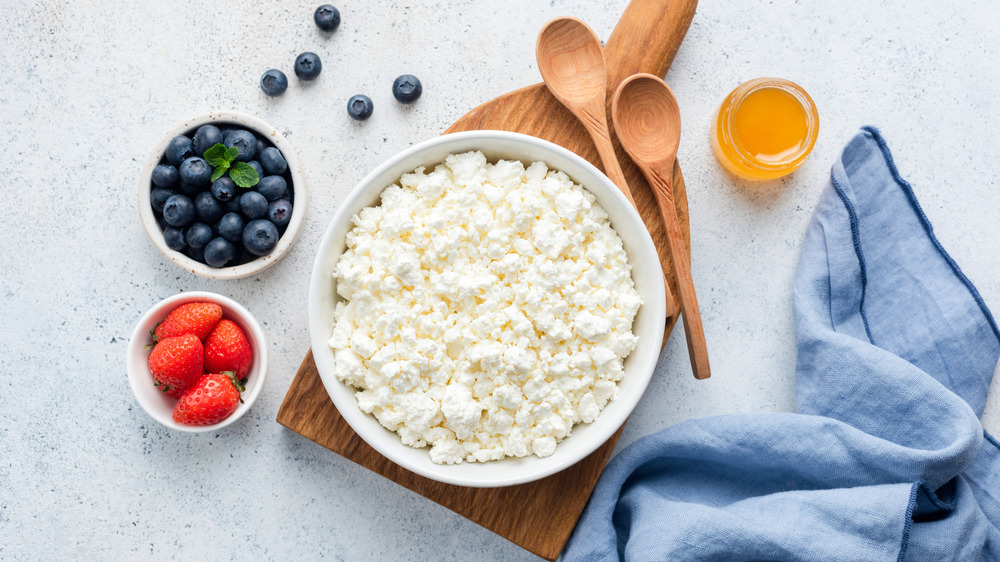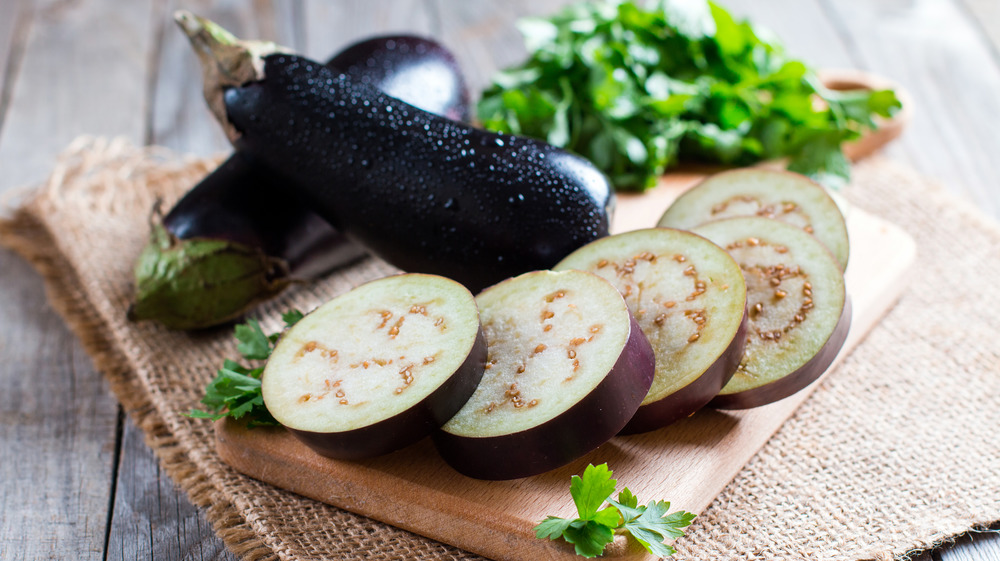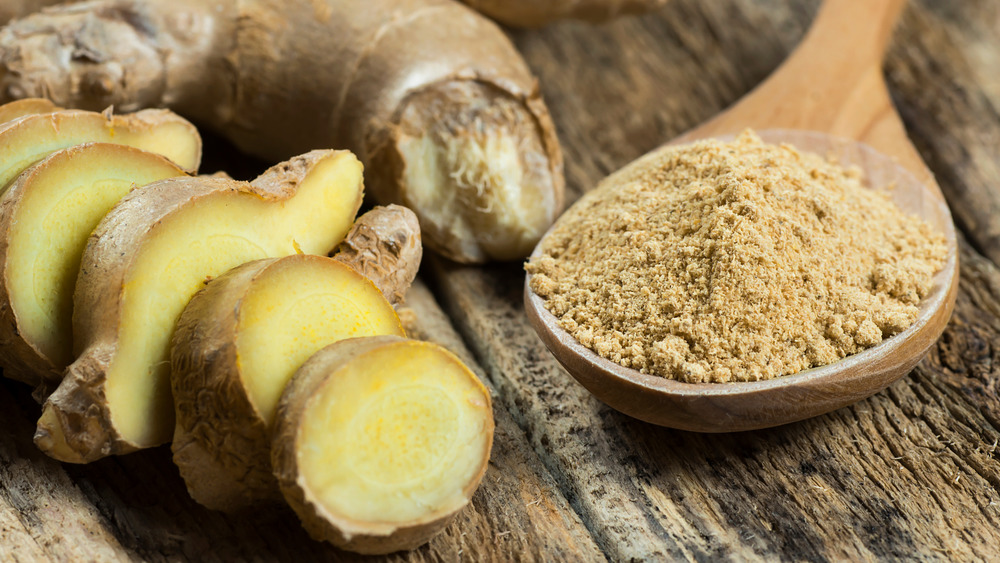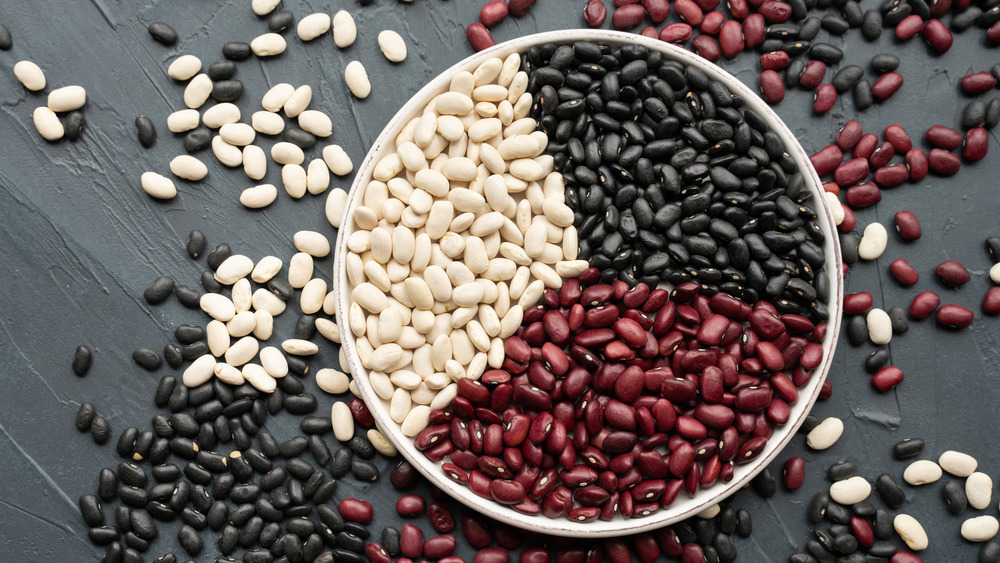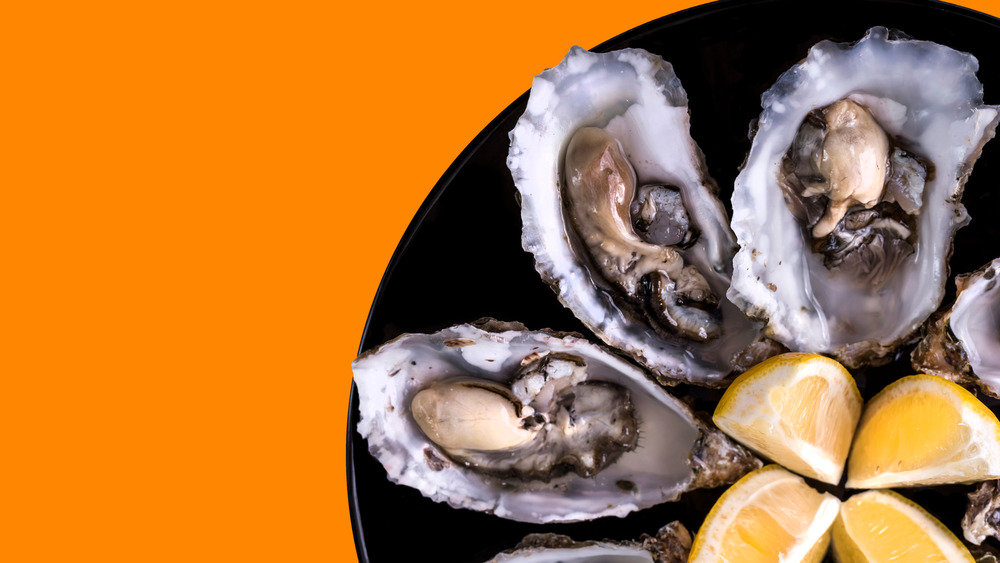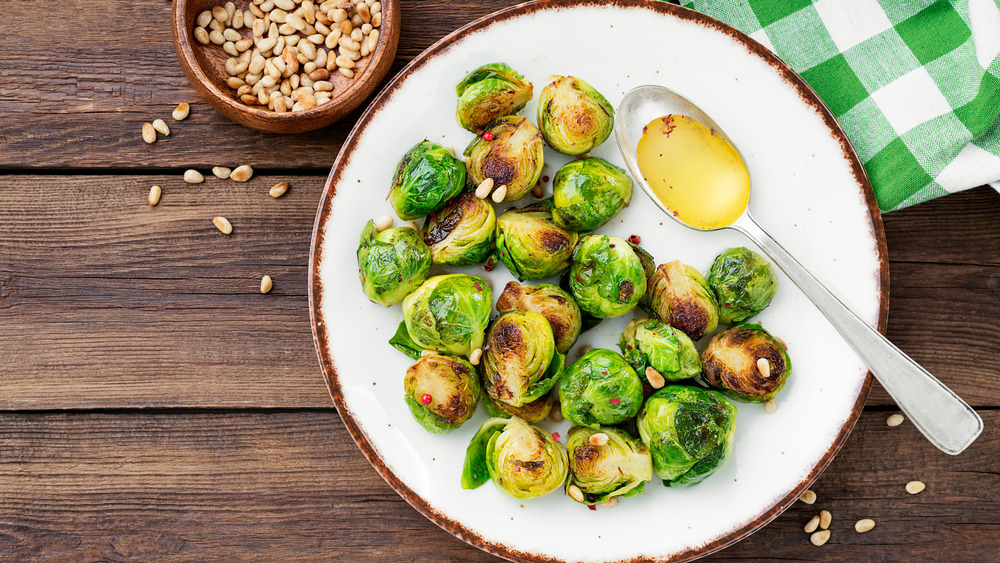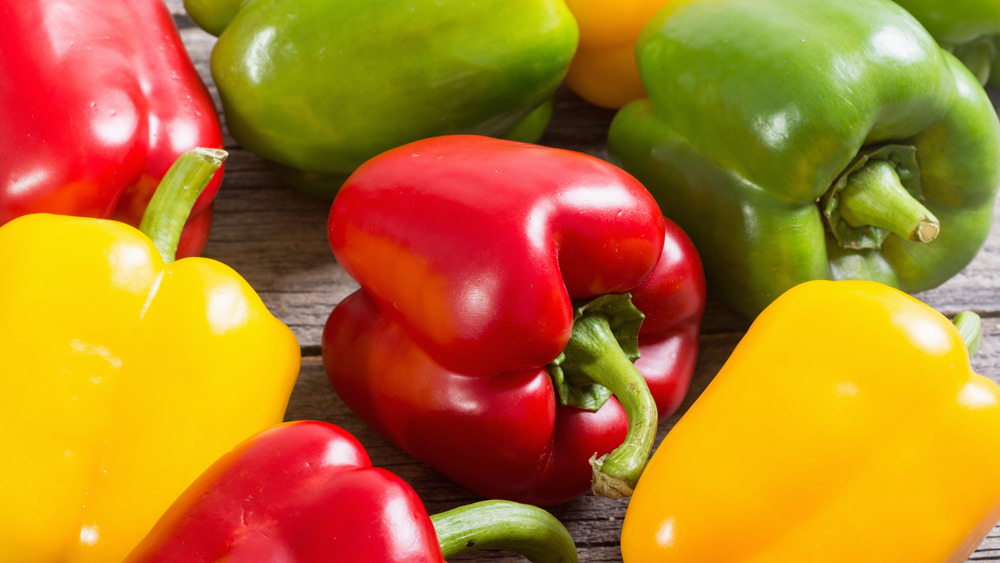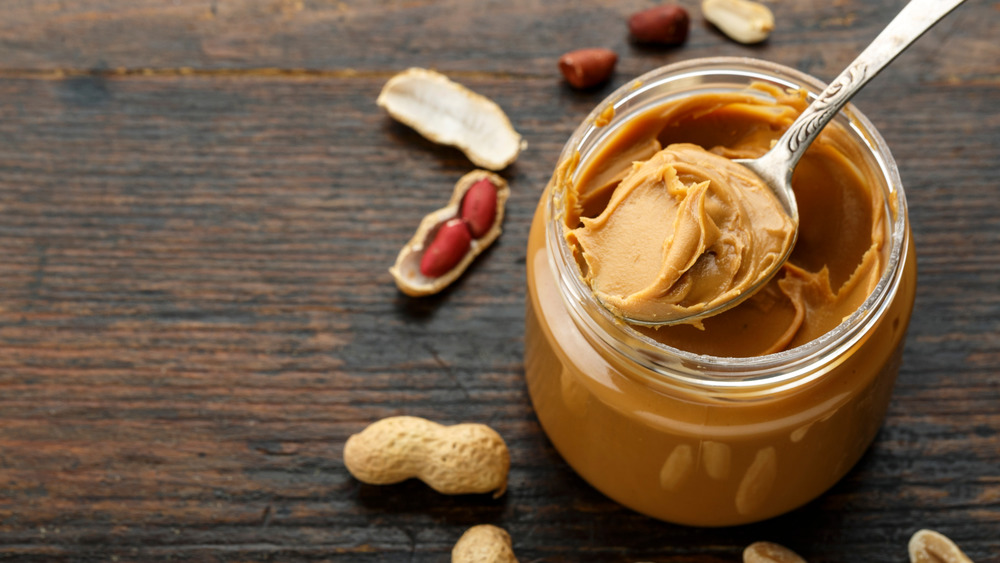Underrated Health Foods You're Probably Not Eating
When you hear about health foods, or superfoods, the usual — spinach, kale, avocado — might come to mind due to their well-known nutritional benefits. Such foods align with the World Health Organization's recommendations for a healthy, balanced diet, rich in fruits, vegetables, legumes, nuts, and whole grains. However, the Centers for Disease Control and Prevention reports that only 10 percent of Americans are getting the recommended number of fruits and veggies.
If you're not drawn to healthy foods, know that such foods don't have to be bland or boring. Switch up your plate now and then with new foods. "Being open to all kinds of food experiences, rather than following your picky eater habits and sticking to a handful of foods, brings novelty into your every day," Sara Haas, registered dietitian nutritionist cookbook author, told Shape. Not sure where to begin? Mix up your healthy diet with the following seriously underrated heath foods.
Include liver in your diet
Instead of chicken breasts, wings, or thighs, try liver. According to Medical News Today, organ meat, like liver, is rich in Vitamin A, which is needed for eye health and reducing the risk of chronic diseases. It's also jam-packed with other vital nutrients, like folic acid, iron, chromium, copper, and zinc.
Organ meats are typically cheaper than other kinds of meat (via Insider). But not only are you saving money, you're also getting a great source of protein. According to Healthline, beef liver, in particular, is a "high-quality protein" that can help get essential amino acids that are needed to make the proteins in your body, help with weight loss, build muscle, and boost your metabolism.
Before you binge on a dish of liver and onions, though, you should know that excessive amounts of vitamin A and copper, as found in liver, can cause adverse effects. Per Healthline, you should consume it only once a week.
Cottage cheese is a healthy snack
Cheese seems like a taboo suggestion for healthy eating, but cottage cheese is very healthy. "It's a vintage diet food, popularized due to its high protein content," Cara Harbstreet, a registered dietitian, told MindBodyGreen. "Compared to other cheeses, dressings, and condiments, it's relatively low in calories and offers the same nutrition as other dairy products."
According to Medical News Today, the high calcium levels in cottage cheese help keep your teeth and bones strong and healthy. A 2013 study in Nutrients found dairy products, including cottage cheese, were associated with a decreased risk of osteoporosis in young women. Additionally, cottage cheese is linked to reduced prostate cancer risk in men, per Medical News Today.
Cottage cheese is a diet staple for good reason: It can help you lose weight. A 2011 study in The Journal of Nutrition found people who ate a high-protein, high-dairy diet combined with daily exercise showed more fat loss and leaner tissue compared to people who had low or moderate dairy in their diet. However, Medical News Today explained that cottage cheese has a high sodium content, which could increase the risk of blood pressure. Eating cottage cheese in moderation is the way to go.
Treat yourself to some eggplant
More than just a suggestive text emoji, the eggplant is the unsung hero of the fruit (yes, fruit!) family. According to Healthline, one cup of the stuff is just 20 calories and filled with nutritious vitamins, minerals, protein, and more. In addition, eggplant has antiviral and antimicrobial properties, which come from the chlorogenic acid, per Health.
Along with being low in calories, eggplants are rich in fiber. A 2010 review in the journal Nutrients reported an inverse relationship between increased fiber and a decreased risk of coronary heart disease and cancer. The researchers also reported that some studies have linked fiber with a decrease in obesity and type 2 diabetes.
Eggplants are also filled with anthocyanins. Not only does this pigment give eggplant the familiar rich purple color, but it also contains antioxidants that help to protect the body against cellular damage, Healthline explained. A 2012 review in Molecular Nutrition & Food Research reported that foods containing anthocyanins were associated with better cognitive function and eye health. Plus, women who frequently eat foods with anthocyanins have "lower arterial stiffness" and blood pressure, a 2012 study in The American Journal of Clinical Nutrition suggested.
There's no need to be gingerly with this spice
If you're looking for delicious cuisine, consider preparing your meals with ginger. As Insider highlighted, ginger is packed with antioxidants. This protects against cell damage that increases the risk of chronic diseases. And because of its antioxidant properties, ginger can help with chronic inflammation. In fact, a study in Arthritis & Rheumatology found that patients who ate ginger extract twice a day in the six-week trial had less knee pain than patients who received a placebo.
Ginger's pain-relieving properties also extend to menstrual cramps. A 2015 study in Pain Medicine found ginger powder effective in treating menstrual pain when used in the first three to four days of the period. And, of course, ginger is easy on the tummy. "Ginger's stomach-calming, anti-inflammatory effects have made it a go-to remedy for thousands of years to ease GI discomfort," Jessica Cording, a registered dietitian and health coach, told MindBodyGreen. "Ginger has both antiemetic and carminative functions, which aid in the breakdown of gas and support bowel movements," Ali Miller, a registered dietitian, told the publication.
According to Healthline, ginger may even aid weight loss. The site explained that this likely happens because ginger either helps to reduce inflammation or burns calories faster.
Beans can reduce your risk for these conditions
While you may want to pass on the gas, there are several reasons why you should risk it and eat beans anyway. According to Medical News Today, beans are an excellent protein source, with soybeans at the very top of the list. This is good news for vegetarians and vegans who need to find a plant source alternative for protein. Additionally, men who eat beans often have a reduced risk of prostate cancer.
Other benefits from beans include folate, which is important in making healthy red blood cells for the body, and antioxidant properties, explained Medical News Today. Beans are especially helpful for the heart. A 2017 study in Public Health Nutrition found a correlation between eating legumes and a 10 percent decreased risk of cardiovascular disease and coronary heart disease.
According to the American Heart Association, beans help with lowering blood cholesterol, which reduces the risk of heart disease. The association recommends adding beans to your diet through meals such as salads, soups, and pasta.
Oysters can do a lot for your health
As an aphrodisiac food, oysters may help your love life. Plus, these mollusks can help you live for a longer time. According to Healthline, oysters are an incredible source of vitamin B12, selenium, iron, vitamin D, copper, and zinc. These vitamins and minerals are particularly important for older people to consume, as such individuals are more likely to be vitamin deficient. "As women get older they can really benefit from this entire list of minerals, especially copper and zinc, which can assist in preventing macular degeneration," Julia Zumpano, a preventive cardiology dietitian, said of oysters when speaking with the Cleveland Clinic.
As Cleveland Clinic explained, oysters are also high in protein — six oysters provide about 12 grams. Oysters also contain a compound called DHMBA with potent antioxidant properties, per Healthline. And this could help treat or even prevent liver disease.
Not sure how to eat oysters? "Steaming is healthiest and best because it will also help kill any harmful bacteria present. Avoid preparing [oysters] in unhealthy fats, such as butter, margarine or cream sauce. And try tossing them in an olive oil or tomato-based sauce for a light, fresh recipe that really compliments their flavor," Zumpano advised.
Brussels sprouts are small but mighty vegetables
Mistaken for baby cabbages, Brussels sprouts are underused and highly underrated. According to Internal Medicine, the fiber in Brussels sprouts lowers harmful cholesterol levels. But fiber isn't the only great thing about these little veggies.
"Brussels sprouts are considered to be a cruciferous vegetable. While cruciferous vegetables vary in their nutrient content, most have high amounts of folate, antioxidants, vitamins K, A, C and fiber," Dr. Elizabeth Klingbeil, an assistant professor of nutrition at Johnson and Wales University, explained to Health Digest. "These nutrients can promote heart, cognitive, and gut health." She recommends eating a cup of Brussels sprouts a few times each week.
However, not everyone loves the unique taste of Brussels sprouts. "[They] can be a bit polarizing when it comes to their flavor," Klingbeil continued. If you're not a fan, you can try other cruciferous vegetables, like cauliflower and broccoli, to get many of the same benefits, the professor revealed.
Bell peppers are colorful and delicious
Color your plate with different types of bell peppers. According to Verywell Fit, bell peppers are low in fat and have high amounts of vitamin A and vitamin B6. And their colors aren't just for show. "The vividness of color is an indicator of ripeness, flavor, and a high concentration of nutrients, per Verywell Fit. Raw green bell peppers have fewer carbohydrates but less fiber than red bell peppers. And as red peppers are the ripest, they have the most nutritional benefits.
Because bell peppers, as a whole, have a high amount of carotenoids, eating them can improve eye health by protecting the light-sensitive part of the eye called the retina from oxidative damage, explained Healthline. Bell peppers can also protect against anemia because it contains iron and a high amount of vitamin C needed to absorb iron from the gut. And because they contain the antioxidant quercetin, they may even reduce your risk of cancer.
There are plenty of reasons to eat dark chocolate
When embarking on the path to healthy living, it can seem like you're saying goodbye to desserts. But you can have your cake and eat it too — and by cake we mean dark chocolate.
"Dark chocolate contains a high concentration of antioxidants. Several randomized controlled trials have shown that dark chocolate consumption may increase cognitive function and decrease risk factors for heart disease. Specifically, antioxidants in dark chocolate neutralize free radicals in our body, preventing damage to cells," Dr. Elizabeth Klingbeil, an assistant professor of nutrition at Johnson and Wales University, told Health Digest.
Dark chocolate also reduces cancer risk, helps with weight loss, improves skin health, and is a good source of nutrients, revealed Everyday Health. Klingbeil also says chocolate is high in calories and should be eaten in moderation. According to Life Enriching Communities, people should be eating no more than 1 to 2 ounces (30 to 60 grams) a day — about the same amount as a Hershey's Special Dark Chocolate bar. According to Healthline, the most nutritious chocolates are high in cocoa. The site recommends looking for dark chocolate that contains at least 70 percent cocoa.
It's time to make garlic a regular household staple
Beyond warding off intruding vampires, garlic's many health benefits should be a reason to keep it in the house. "Garlic has been shown to exert cholesterol- and triglyceride-lowering actions," Amanda Bakko, a nutritionist at Northwestern Medicine McHenry Hospital, revealed in an article for Northwestern Medicine. "Garlic's rich phytochemical content delivers its potential cholesterol-lowering and cancer-fighting characteristics."
With very few calories, garlic can boost your immune system and may help reduce severe cases of the flu and common cold, according to Healthline. Garlic has also been shown to improve heart health. Healthline explained that garlic reduces blood pressure, which in turn lowers the risk for heart attacks and strokes. It also lowers LDL ("bad") cholesterol levels, which reduces the risk of heart disease. Plus, the antioxidants found in garlic slow down the aging process and overall contributes to a longer lifespan. And if that weren't enough, a 2020 study in Dermatologic Surgery found adding garlic ointment helped with wound healing.
To maximize the nutritional benefits found in garlic, the Cleveland Clinic recommends eating it raw. However, if you do cook garlic, keep the temperature below 140 degrees Fahrenheit. This is because high temperature destroys allicin, the compound in garlic that reduces inflammation.
Don't avoid frozen fruits and vegetables
Fresh produce may seem like the healthiest option, but it can be expensive and spoil quickly. This is one of many reasons you should look to frozen fruit and vegetables. Jaclyn London, a registered dietitian and head of nutrition and wellness at WW, told Health Digest, "They're great options when you're short on time or don't have access to fresh options. And since frozen produce is picked and flash-frozen at the perfect ripeness and its nutritional peak, you'll get the same taste and benefits as eating it fresh."
Frozen produce has a longer shelf life, and it's not because of artificial or unhealthy preservatives; freezing is what preserves their nutrition. According to Healthline, frozen produce is also prepared within a few hours after picking, with no chemicals added. A 2015 study in Agricultural and Food Chemistry found no differences in vitamins and overall nutrition between frozen and fresh fruits and vegetables, including spinach and blueberries.
Compared to the produce in your local grocery store, frozen fruits and vegetables could be an even better choice. "If you are shopping at the supermarket, frozen produce may be equal to, or in some cases, even more nutritious than fresh varieties," per Healthline. However, the nutrients in frozen fruits and vegetables do start to disintegrate if stored for over a year.
Peanut butter is healthy in moderation
Peanut butter by itself is highly underrated. Harvard Heart Letter explained that even though it contains some saturated fat, peanut is still very healthy. The nut butter has been linked to a reduced risk of heart disease and type 2 diabetes.
According to WebMD, peanut butter contains omega-6 and oleic acid, which help manage cholesterol levels. In addition, the presence of arginine in peanut butter expands blood vessel function thereby lowering heart disease. Peanut butter's antimicrobial properties includes coumaric acid and resveratrol, which have shown evidence of reducing the risk of cancer. However, the key to peanut butter is moderation.
"Peanut butter is a great source of protein, magnesium and unsaturated fats. But, like all foods, you can have too much of a good thing. Peanut butter is a fairly energy-dense food, so it's important to be aware of the serving suggestion of two tablespoons when you're consuming peanut butter," Dr. Elizabeth Klingbeil, an assistant professor of nutrition at Johnson and Wales University, told Health Digest. To avoid unwanted weight gain, she recommends choosing peanut butter brands that advertise fewer than 5 grams of added sugar per serving.
Drop the chips and pick up the popcorn
Popcorn isn't just meant for the movies. It can be modified into a healthy treat. "Popcorn can sometimes get a bad reputation for being doused in butter, oil, and salt at the movie theater or county fair. But don't let the toppings fool you, popcorn can absolutely be a healthful snack," registered dietitian Jaclyn London told Health Digest. "Air-popped popcorn is nutritious, fiber-filled, and even contains some antioxidants."
When left unsalted and air-popped, it contains 78 percent carbohydrates. "This means that it is healthful for people with diabetes only if they eat it in moderation," per Medical News Today. Because it's low in calories, fat, and sugar, adding popcorn to a balanced diet may help with weight loss goals. "This snack is especially great because it's packed with protein and fiber — the combo of which research shows is better at keeping you fuller, longer," London told Health Digest.
The American Heart Association also says popcorn has antioxidant properties called polyphenols, which have been associated with better blood circulation, decreased risk of cancer, and a healthy digestive system.
In moderation, pinot noir and other red wines can benefit your health
Red wine contains a compound called resveratrol that prevents blood vessel damage and reduces LDL ("bad") cholesterol levels (via Mayo Clinic). And of all the varieties of red wine on the market, pinot noir tops the list of healthiest choices. According to the North American Mental Health Professional Advice Council, pinot noir has the highest amount of resveratrol, few sugars, and a lower amount of calories than other red wines.
However, the health benefits of red wine is only observed when consumed in moderate amounts. "Early research found that moderate levels of wine consumption had a 'J'-shaped curve effect," Helena Conibear, co-director of the International Scientific Forum on Alcohol Research, told BBC Future. "Small, regular amounts of wine seem to lead to longer life, better health and less cognitive decline."
Additionally, registered dietitian Jaclyn London told Health Digest, "Moderate alcohol consumption, including red wine, can help promote cognition/mood, and reduce risk for certain types of cancer and diabetes." A 2019 review reported a connection between red wine and a decrease in heart disease, due to red wine's ability to lower LDL cholesterol levels.



